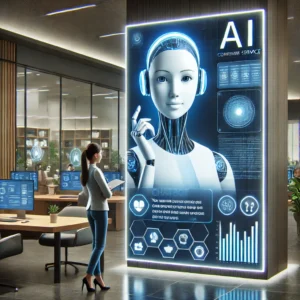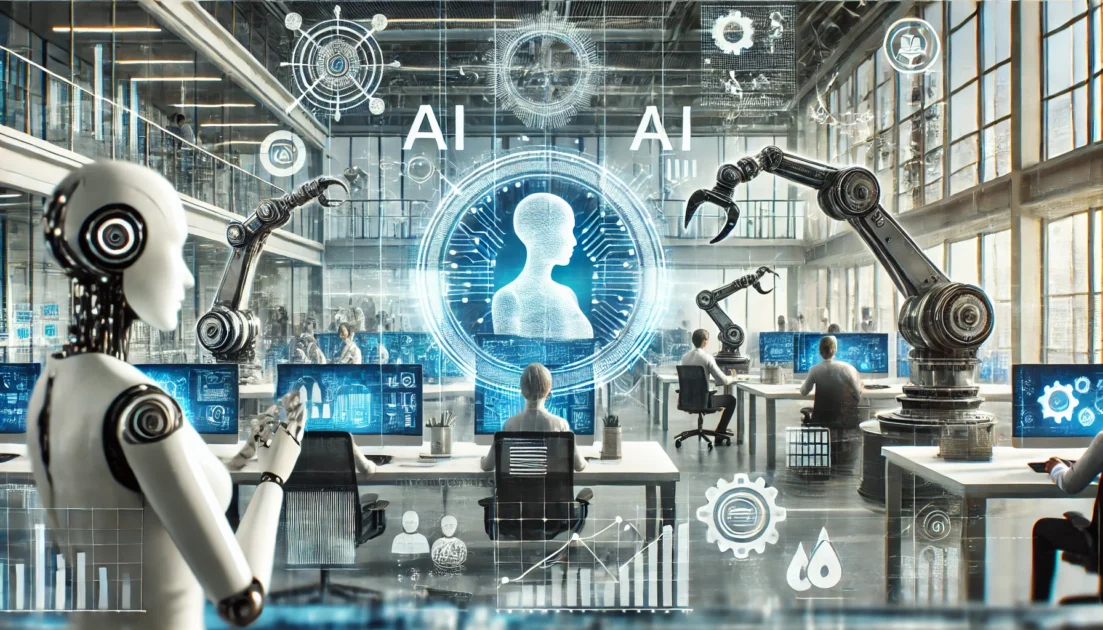How AI in Business is Transforming Industries: Benefits, Challenges, and Future Trends
Introduction
Artificial intelligence (AI) is revolutionizing industries across the globe, reshaping how businesses operate, make decisions, and interact with customers. From automating mundane tasks to providing deep insights through data analytics, AI is no longer a futuristic concept—it is a present reality. Companies that leverage AI effectively can boost efficiency, reduce costs, and create better customer experiences. In this article, we will explore how AI is used in business, its benefits, challenges, and future trends.
How AI is Used in Business

AI has found applications in nearly every sector, enabling businesses to streamline operations and enhance productivity. Here are some key areas where AI is making a difference:
1. Automation and Efficiency
AI-driven automation is helping businesses reduce manual work and improve efficiency. Tools powered by AI can handle repetitive tasks such as data entry, customer support, and HR processes, allowing employees to focus on strategic activities. Robotic Process Automation (RPA) is widely used in finance, healthcare, and logistics to automate workflows and reduce human errors.
2. AI-Powered Analytics and Decision-Making
Businesses rely on data to make informed decisions, and AI enhances this capability by providing advanced analytics. Machine learning algorithms can analyze large datasets to identify patterns, predict trends, and generate actionable insights. AI-driven business intelligence tools help companies optimize supply chain management, sales forecasting, and risk assessment.
3. AI in Customer Service

Customer experience is crucial for business success, and AI-powered solutions like chatbots and virtual assistants are transforming customer interactions. Chatbots can provide instant responses to inquiries, reducing wait times and improving customer satisfaction. AI can also personalize interactions by analyzing customer behavior and preferences.
4. AI in Marketing and Sales
AI enhances marketing strategies by analyzing consumer behavior and predicting purchasing patterns. Businesses use AI-driven tools to automate email marketing, optimize ad campaigns, and deliver personalized recommendations. AI also helps in lead generation by identifying potential customers based on data insights.
5. AI in Human Resources
Recruitment and HR management are being streamlined through AI-powered tools. AI can scan resumes, match candidates with job requirements, and even conduct initial interview rounds using natural language processing (NLP). It also helps HR teams monitor employee engagement and predict workforce trends.
6. AI in Finance and Fraud Detection
Financial institutions leverage AI to detect fraudulent transactions, assess credit risks, and optimize investment strategies. AI algorithms analyze transaction patterns in real time to identify anomalies and prevent fraud. Additionally, robo-advisors help individuals and businesses make data-driven investment decisions.
Top AI Tools for Businesses
Businesses can utilize various AI tools to enhance their operations. Some of the most popular AI-driven platforms include:
- ChatGPT & IBM Watson (for customer support and AI-driven communication)
- Hootsuite & HubSpot AI (for marketing automation and analytics)
- Salesforce Einstein (for sales forecasting and customer relationship management)
- UiPath (for robotic process automation)
- Tableau & Google Analytics AI (for business intelligence and analytics)
These AI tools help businesses save time, improve efficiency, and make data-driven decisions.
Benefits of AI in Business
The adoption of AI in business provides numerous advantages, including:
1. Cost Savings
By automating tasks and reducing errors, AI helps businesses lower operational costs. AI-driven tools can perform tasks faster and with greater accuracy, reducing the need for human intervention in repetitive processes. Ai In Business
2. Improved Efficiency and Accuracy
AI can process vast amounts of data in seconds, helping businesses optimize decision-making. AI algorithms enhance accuracy in tasks such as financial forecasting, demand prediction, and quality control.
3. Better Customer Experience
AI enables businesses to offer personalized experiences to customers. AI-driven chatbots, recommendation systems, and voice assistants ensure customers receive timely and relevant responses, improving overall satisfaction. Ai In Business
4. Competitive Advantage
Businesses that adopt AI early gain a competitive edge by optimizing their operations and offering superior products or services. AI-driven insights help companies stay ahead of market trends and customer demands.
5. Scalability
AI-powered systems allow businesses to scale efficiently without a proportional increase in human resources. Automation enables companies to handle higher workloads without compromising quality. Ai In Business
Challenges and Risks of AI Adoption
Despite its numerous benefits, AI adoption comes with challenges that businesses must address:
1. High Implementation Costs
Developing and integrating AI solutions can be expensive. Small businesses may struggle with the high costs of AI tools, infrastructure, and skilled professionals.
2. Ethical and Privacy Concerns
AI systems process vast amounts of data, raising concerns about data privacy and security. Businesses must ensure they comply with regulations like GDPR to protect user data.
3. Job Displacement
AI automation can replace certain jobs, leading to concerns about unemployment. Businesses must focus on upskilling employees and creating new job roles to adapt to AI-driven changes. Ai In Business
4. Bias in AI Algorithms
AI systems can inherit biases from training data, leading to unfair decision-making. Companies must ensure transparency and fairness in AI algorithms to prevent discrimination.
The Future of AI in Business
The evolution of AI presents exciting opportunities for businesses. Here are some key trends shaping the future of AI in business:
1. AI-Driven Hyper-Personalization
AI will continue to enhance personalization in marketing, e-commerce, and customer interactions. Businesses will leverage AI to deliver highly targeted and customized experiences.
2. AI and IoT Integration
The combination of AI and the Internet of Things (IoT) will enable smart automation in industries such as manufacturing, healthcare, and logistics. AI-driven IoT devices will optimize efficiency and reduce costs. Ai In Business
3. AI-Powered Cybersecurity
As cyber threats increase, AI-driven security systems will play a crucial role in detecting and preventing attacks in real time. Businesses will adopt AI-based cybersecurity solutions for enhanced protection.
4. No-Code and Low-Code AI
AI development will become more accessible with no-code and low-code platforms, allowing businesses to implement AI solutions without extensive technical expertise.
5. Ethical AI and Responsible AI Development
Businesses will focus on creating transparent, unbiased, and ethical AI models to build trust and ensure compliance with regulations.
Conclusion
AI is transforming businesses by enhancing efficiency, improving customer experiences, and providing data-driven insights. While AI adoption presents challenges, businesses that embrace AI strategically can gain a significant competitive advantage. As AI technology continues to evolve, companies must stay updated on the latest trends and invest in AI solutions that align with their goals. The future of AI in business is promising, and those who leverage its potential will thrive in the digital era.
What is Artificial Intelligence (AI) in Business?
